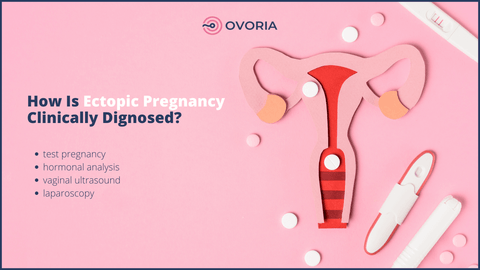Ectopic Pregnancy: Symptoms, Causes and Treatments
Few kinds of research indicate that more than 1% of pregnancies are ectopic. Inflammation, infection, taking birth control pills, smoking can increase a woman's chances of having an ectopic pregnancy. In this article, you will find out information about symptoms, causes, diagnosis and treatments of ectopic pregnancy

What Is an Ectopic Pregnancy?
For becoming pregnant, the female ovary releases an egg. The egg stays in the fallopian tube for up to 24 hours. This fertilized egg which grows into the baby rests in the fallopian tube for almost three to four days. Then it will be transferred into the uterus and attached to the lining, where it will develop until it is ready to be born. However, sometimes fertilized eggs fail to reach the uterus and implant themselves in the fallopian tube, cervix, ovary, abdomen area. In cases of ectopic pregnancies, a pregnancy test would show positive results. However, the fertilized egg cannot grow appropriately without being implanted into the uterus. The American Academy of Family Physicians conducted a study that revealed that every 50th woman suffers from an ectopic pregnancy.
There are a few types of ectopic pregnancy:
Heterotopic Pregnancy
In some cases of ectopic pregnancy, medical experts have found two fertilized eggs, one being inside the uterus and the other outside the uterus. This type of pregnancy is known as heterotopic pregnancy. Often these types of pregnancies are noticed. Ectopic pregnancies are identified and treated at an early stage of pregnancy, making the ultrasound incapable of discovering the additional pregnancy within the uterus. However, the HCG levels do not stop rising after the removal of ectopic pregnancy. These days, the rate of heterotopic pregnancies is rising due to the use of IVF treatment.
Nontubal Ectopic Pregnancy
Only 2% of women can have pregnancy developing in an ovary, cervix, or within the abdomen. Although there are very few cases of nontubal ectopic pregnancy, its existence cannot be neglected. There have been such cases where a live baby has been delivered from a nontubal ectopic pregnancy. In such cases, the placenta finds a place on the intraabdominal organs and receive sufficient blood supply to stay alive.
Ectopic Tubal Pregnancy
In ectopic tubal pregnancy, the embryo nests in the fallopian tubes and produces inflammation and tubal obstruction. In this type of pregnancy, the egg can grow in the ampullary section, the fimbrial end. In ectopic tubal pregnancies, which occur in the Fallopian tubes rather than the uterus, the mortality rate is higher at the isthmus than elsewhere in the tube because of its increased vascularity, leading to heavy bleeding that can be dangerous for a woman.
Persistent Ectopic Pregnancy
Persistent ectopic pregnancy is the continuous growth of trophoblastic tissue after an ectopic pregnancy has been surgically removed. Sometimes, tissues involved in this process escape the treatment. When there is a pregnancy, the embryo will embed itself in the fallopian tube. As time goes by, the tissues of the embryo keep growing and generate higher HCG levels. This often leads to heavy internal bleeding and other such clinical symptoms.
Pregnancy of Unknown Location (PUL)
When a woman is observed to be pregnant, but there is no sign of pregnancy with transvaginal ultrasonography, it is referred to as a PUL or pregnancy of an unknown location. Approximately 10% of women who opt for ultrasound
What Are the Symptoms of an Ectopic Pregnancy?
At early pregnancy, it can be pretty challenging to identify the risk of ectopic pregnancy. The symptoms of ectopic pregnancy at a very early stage and even after IVF are pretty similar to uterine pregnancy. If a woman has missed a menstrual period, experienced drowsiness, breast tenderness and some discomfort in the belly, you may be suffering from an ectopic pregnancy. However, more than 50% of women suffering from an ectopic pregnancy will not experience these symptoms. There is a list of possible symptoms of IVF ectopic pregnancy:
- Weakness
- Vaginal bleeding
- Shoulder pain
- Nausea
- Severe pain of lower abdomen
- Dizziness
Another difficulty with ectopic pregnancy is that the signs vary widely from person to person. It is noticeable as early as four weeks in some cases, but it may not appear until 12 weeks for others. For example, not every woman needs to experience the symptoms of an ectopic pregnancy.
Some women also misunderstand an ectopic pregnancy as gastroenteritis or miscarriage due to mixed signs and symptoms. More signs indicate the risks of ectopic pregnancy symptoms at four weeks: increased HCG levels, pelvic pain, vaginal bleeding, or diarrhoea. Because most of the symptoms are almost the same as during pregnancy, it's essential not to ignore guts and immediately consult a healthcare provider if a woman is afraid of her pregnancy.
What Are the Causes of an Ectopic Pregnancy?
There are a few possible factors that can affect a woman’s fertility and increase her chances of having ectopic pregnancy:
Inflammatory Pelvic Disease or Infection: Sexually transmitted infections cause inflammation in the tubes, increasing the chances of ectopic pregnancy.
Taking birth control: Using an IUD device is rare, but the chances of having ectopic pregnancy are higher.
Smoking: A woman who smokes has a higher risk of ectopic pregnancy as they carry increased protein PROKR1 in fallopian tubes. The presence of specific proteins in the fallopian tube can inhibit the mobility of a fertilized egg, thereby disrupting its implantation.
Having ectopic pregnancy previously: If a woman had an ectopic pregnancy in the past, her chances of having ectopic pregnancy are higher in the present. After getting a positive pregnancy test, a woman needs to contact her doctor immediately.
Fertility treatment: In case if a woman has an IVF cycle, her chances of having ectopic pregnancy are higher during embryo transfer. During implantation, embryos fail to reach the uterus and then settle into the fallopian tube.
Endometriosis: Unfortunately, there is no specific cause why endometriosis increases the risk of ectopic pregnancy
How Is Ectopic Pregnancy Clinically Dignosed?
The early diagnosis can be diagnosed in a few ways:
- Test pregnancy
- Hormonal analysis
- Vaginal ultrasound
- Laparoscopy
This test informs women of a possible gestation depending on the weeks of pregnancy. It is performed above all on patients undergoing a technique of assisted reproduction. A diagnosis of ectopic pregnancy is not achieved with a single hormonal analysis since false positives are possible. Repeat the test 2 weeks later to be able to see the presence of the embryo sac.
When there is no sac in the uterus, the possibility of an ectopic pregnancy should be assessed, and this possibility should be confirmed by a new analysis of the β-hCG values and other biochemical markers such as Placental protein 14, Ca-125 and creatine phosphokinase values.

What Are the Treatments of Ectopic Pregnancy?
There are a few treatments for ectopic pregnancy:
- Surgery
- Medications
- Management
The medical choice of one treatment or another is evaluated according to the diagnostic tests performed and the patient's symptoms. If the tube ruptures seriously, it will be necessary to do other interventions, such as blood transfusion and even a salpingectomy if the tube is badly damaged.

